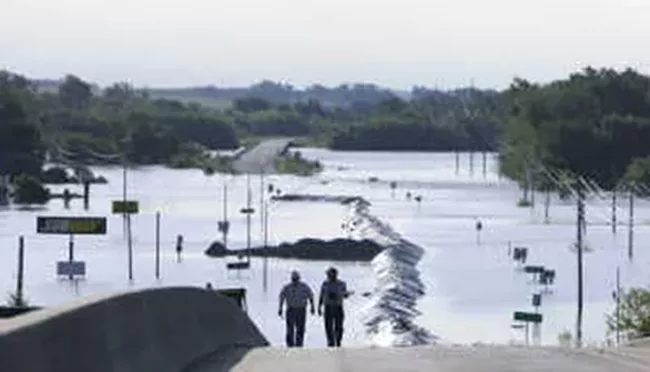
2008 Flood in Columbus Junction; Photo Courtesy of the Associated Press
Sitting at the confluence of the Iowa and Cedar Rivers in Louisa County, Columbus Junction has dealt with flooding issues including widespread events in 2008, 1993 and prior. The city was chosen in 2023 as one of four to join the Iowa Flood Resilient Communities Cohort, along with Muscatine, Dubuque and Manchester. These cities will work with the Iowa Flood Center (IFC) and American Flood Coalition (AFC) to mitigate future hazards. Iowa Flood Center Program Manager with the University of Iowa Hydroscience and Engineering Department Kate Giannini says the program was based on a pilot program from the Carolinas. She shares how communities were chosen, “We were really looking for some smaller communities that didn’t have the capacity or as many resources as some of the mid to larger sized communities in Iowa. We knew that we definitely wanted to work with them and we also wanted to focus on communities that were more socially vulnerable. They were located as maybe a possible environmental justice community, so we wanted to be able to provide them with resources pro-bono so they had a better chance at reaching federal funding that was coming through.”
Over more than a year, the three entities, Columbus Junction officials, IFC and AFC met, toured and identified locations of interest to form a preemptive plan of action. Giannini explains the process of diagnosing issues and forming the action plan, “Through the year-long process of working with Columbus Junction, their mayor, council and Public Works Director Todd Salazar, we were able to have a series of meetings. Then we also worked with the Southeast Iowa Planning Commission to grow that relationship with the city of Columbus Junction. During that process, the city identified pump infrastructure that they wanted to replace. It’s something that I think has been there since the 1960s. If that pump fails, they are more susceptible to flooding in the downtown area which also includes the grocery store, the senior center, critical infrastructure. They would like to seek funding for developing a stormwater masterplan and take a watershed approach to addressing some flood mitigation upstream.”
Eventually this plan with three action items was presented at a March city council meeting. The suggestions included; replacing an aging pump with a new device or culvert system to deal with heavy rain events, seeking funding for developing a storm water master plan and taking a watershed approach to addressing flood mitigation and water quality upstream in the Short Creek Watershed using data analysis from IFC. The Iowa DNR and Iowa Department of Homeland Security were also included in discussion and data collection. Giannini says that the analysis and subsequent report is a good first step for the city when they begin to apply for funding for implementation. The next step is for the city to submit a request for federal funding to the Department of Homeland Security, Emergency Management Service and FEMA for a pump replacement. Though the Cohort project has concluded the IFC has plans to follow up on Columbus Junction’s progress. For more information about the process tune in to next week’s In Touch with Southeast Iowa Program with Giannini on KCII.

